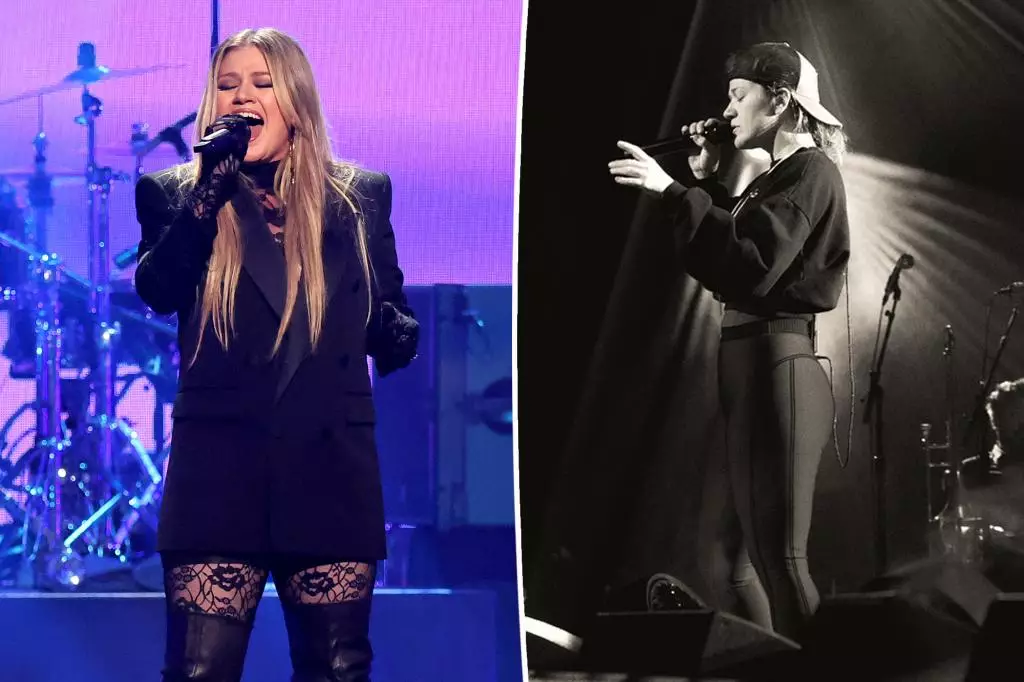In recent times, the entertainment industry has witnessed a shift from relentless performances towards prioritizing artists’ health and well-being. Kelly Clarkson’s decision to postpone her highly anticipated Las Vegas residency highlights this transformation. Despite the disheartening timing—just 90 minutes before the show—her choice underscores an essential truth: even seasoned performers face physical limits. Clarkson’s candid admission regarding vocal strain and the toll of intensive rehearsals reveals a level of transparency that many fans overlook. Her commitment to delivering a top-tier experience demonstrates integrity, yet it also exposes a significant issue—artists often feel compelled to push their bodies to the brink to meet audience expectations.
While fans may initially see cancellations as a matter of inconvenience or disappointment, a deeper analysis reveals that such decisions are often rooted in the necessity of self-care. Clarkson’s willingness to take time off rather than risk lasting damage to her voice signifies a responsible attitude, one that sets a precedent for industry standards. The pressure to constantly perform at peak levels can lead performers down a destructive path, and her example might inspire a broader conversation about sustainable artist careers. Ultimately, her illness or fatigue should not be viewed as a failure but as a sign that even elite performers are human.
Fan Reactions and the Complexity of Expectations
The immediate fallout from Clarkson’s last-minute cancellation was palpable within the fan community. Many expressed disappointment, frustration, and even anger, feeling justified in expecting more transparency and compensation for their sacrifices. Some argued that vaccinated fans who travel across states or even countries for these events deserve protections, including reimbursement or insurance, when cancellations occur unexpectedly. This sentiment reveals a common tension in live entertainment: the expectation that artists prioritize fans’ investments, both emotional and financial.
However, it’s crucial to recognize the nuance in these reactions. Not all fans dismissed Clarkson’s health concerns; many showed empathy. Comments praising her for taking care of her voice reflect an understanding that artistry involves vulnerabilities. This dichotomy illustrates that while fans are entitled to their feelings, they must also grapple with the reality that artists’ well-being must come first. The industry’s current framework often lacks adequate mechanisms—like insurance or guarantees—to protect both performers and audiences against unforeseen cancellations. Clarkson’s situation could serve as a catalyst for advocacy of stronger policies that safeguard consumers and performers alike.
The Broader Context: The Strain of Modern Fame and Multiple Roles
Kelly Clarkson’s recent cancellations arrive amid broader discussions about the stresses modern celebrities face. Besides her upcoming Vegas engagement, Clarkson is also navigating the challenges of her long-standing talk show, “The Kelly Clarkson Show,” with rumors suggesting she may step back after her contract ends. Juggling touring, TV commitments, and personal struggles creates a complex web of obligations that can lead to burnout. Clarkson’s candidness about her vocal health and her willingness to prioritize self-preservation reflect a shift in how performers manage their careers.
This multifaceted pressure, compounded by the public’s relentless scrutiny, often causes performers to make difficult choices that may disappoint their fanbase temporarily. However, rejecting the destructive cycle of overwork can ultimately lead to more sustainable careers and greater longevity in the industry. Clarkson’s stance challenges the misconception that a star must always push through pain and exhaustion—a notion deeply ingrained in the industry’s DNA. Instead, her decision acts as a reminder that authenticity and self-care are powerful tools for reshaping success in entertainment.
Reckoning with Industry Expectations and Personal Boundaries
The tumult surrounding Clarkson’s concert cancellation sparks a larger conversation about accountability and the realities of live performances. Fans must reconcile their desire for entertainment with the genuine needs of performers to safeguard their health. The industry must evolve from reactive measures—like last-minute refunds or vague promises—to proactive policies that include health insurance, contingency planning, and transparent communication.
Clarkson’s case exemplifies the ongoing struggle between artistic integrity and commercial pressure. While her decision disappointed fans in the moment, it also highlighted the importance of respecting artists’ boundaries. In the age of social media, where moments of vulnerability can be amplified, Clarkson’s openness about her health sends a vital message: even those at the top of their game are not immune to limitations. This awareness can inspire both fans and industry stakeholders to foster a healthier, more empathetic environment where performers are valued not solely for their productivity but for their well-being.
By critically examining Clarkson’s situation, it becomes evident that her choice to pause her residency isn’t just about one canceled show; it reflects a profound shift toward prioritizing sustainable artistry. Her willingness to listen to her body and communicate openly challenges industry norms, laying the groundwork for a more compassionate future in live entertainment.

